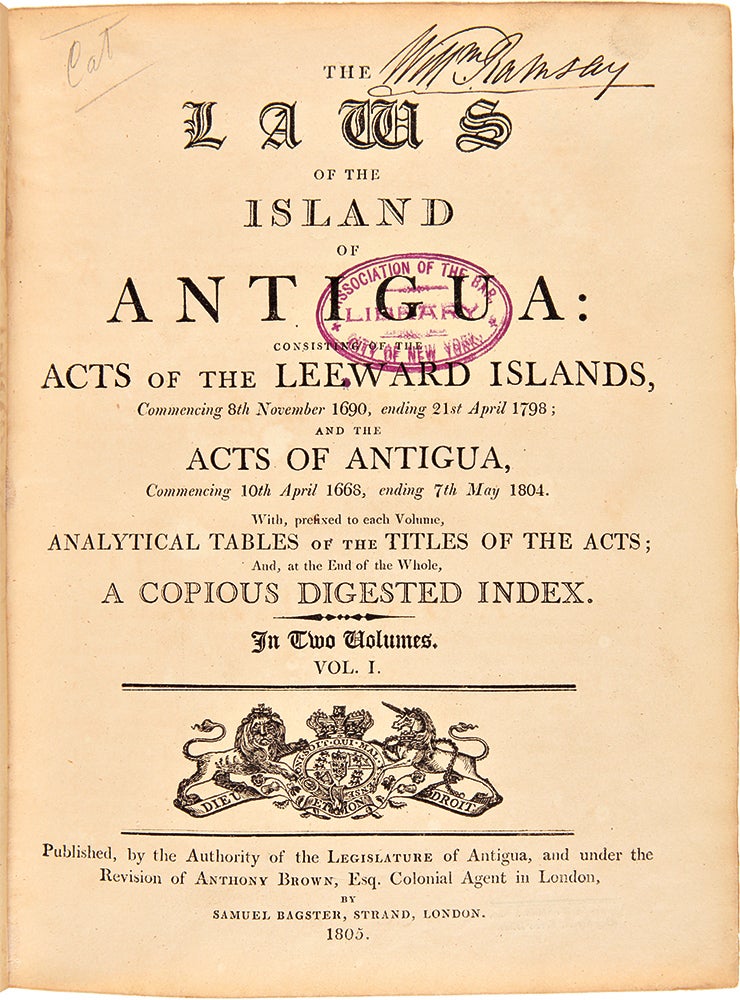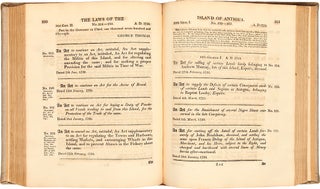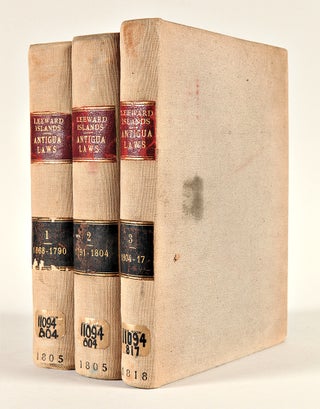[ANTIGUA]
The Laws of the Island of Antigua: consisting of the Acts of the Leeward Islands, commencing 8th November 1690, ending 21st April 1798; and the Acts of Antigua, commencing 10th April 1668, ending 7th May 1804. With, prefixed to each Volume, Analytical Tables of the Titles of the Acts; And, at the End of the Whole, A Copious Digested Index.
London: 1805-1818. Three volumes, quarto. (10 1/4 x 8 1/4 inches). [8], lxvii, 584; [4], xx, 636; [4], xxvii, 467pp. Library ink stamps and contemporary ownership inscription on titlepages. Light dampstaining, particularly to first leaves of second volume. Marginal tape repair to p.301 in first volume.
Buckram, leather labels
The laws of the island of Antigua from 1668 through 1817, also including the laws of the Leeward Islands from 1690 to 1798 including an act prohibiting the practice of Obeah.
Antigua, colonized by the British in the mid-17th century, served as a major sugar producer and hub for shipping in the West Indies. The laws include those governing titles to lands, numerous regulations on slaves, and duties on sugar and molasses produced on the island. The American Revolutionary War caused a significant disruption in the sugar trade, and British sentiment against slavery further served to shift the economy of the island in the late-18th century. These laws were originally issued as a two volume set in 1805, though the third volume followed in 1818 and is noted as Volume III on the title page, covering the period 1805-18. Despite growing British sentiment against slavery in the 19th century, Volume III of the present collection contains an act that serves as evidence of the colonial power's expansive stronghold not only over the lands, the rights, and the bodies of the enslaved and native populations but also over their beliefs and cultural practices. In August 1809, an act was passed that prohibits and punishes "such Persons as pretend to exercise any Witchcraft, Fortune-telling, or any Crafty Science" (p.178). The act aims to prevent scamming and "mischiefs" and attacks those who practice Obeah, a series of African diasporic traditions that fuse religious, science, and cultural practices into forms of spell-casting and healing. Though Obeah involves both supernatural and medical elements, the former aspect threatens hapless colonizers who failed to understand these traditions, causing them to view the healing aspect, too, as threatening. Such a hostile interpretation by British colonials is evidenced in a blanket clause in the same 1809 act which states, "if any Negro, or other Slave, shall mix or prepare, with an Intent to give or cause to be given any Poison, or Poisonous drug,--in the Practice of Obeah, or otherwise...the said Slave or Slaves, together with their Accessaries [sic.]...shall suffer Death" (p.179). The present collection of laws thus represents the arbitrary legislative structure that justified and fortified colonial governing of the resources of the island of Antigua as well as serving as an example of how a colonial power dealt with what Franz Fanon termed "cognitive dissonance" upon encountering different cultural beliefs, that is, by punishing, subjugating, and erasing, making the work an important evidence and a timely reminder of how a legislative structure can target and attack culturally important aspects of vulnerable populations.
Early Caribbean Digital Archive; Crosson, "What Obeah Does Do: Healing, Harm, and the Limits of Religion," in Journal of Africana Religions 3, no. 2 (2015).
Item #28897
Price: $4,800.00




